Summer is traditionally a time of travel vacations for many families. There is no doubt that travel is more difficult during COVID-19, with its associated risks and restrictions. Before a decision is even made to travel, a careful assessment of the risks, and your family’s tolerance for the same, should be made. If the decision is ultimately made to travel, the next assessment is the appropriate method of transportation. It is very understandable that not everyone is ready to engage in air travel at this point in the pandemic. Road trips in a motor vehicle are also not free of risk, but many people prefer to avoid the exposure of spending time in an airport and then in close physical proximity with others on an airplane. As your integrative pediatrician and medical home in the Mile High City, we do our best to be alert to all aspects of your child’s health care, including their emotional well-being. As a result, we are here to offer some tips and information, gathered from various sources, for as-safe-as-possible road trips with your family this summer. Although you will need to be aware and take precautions, the opportunity still exists for fun and the making of wonderful family memories!
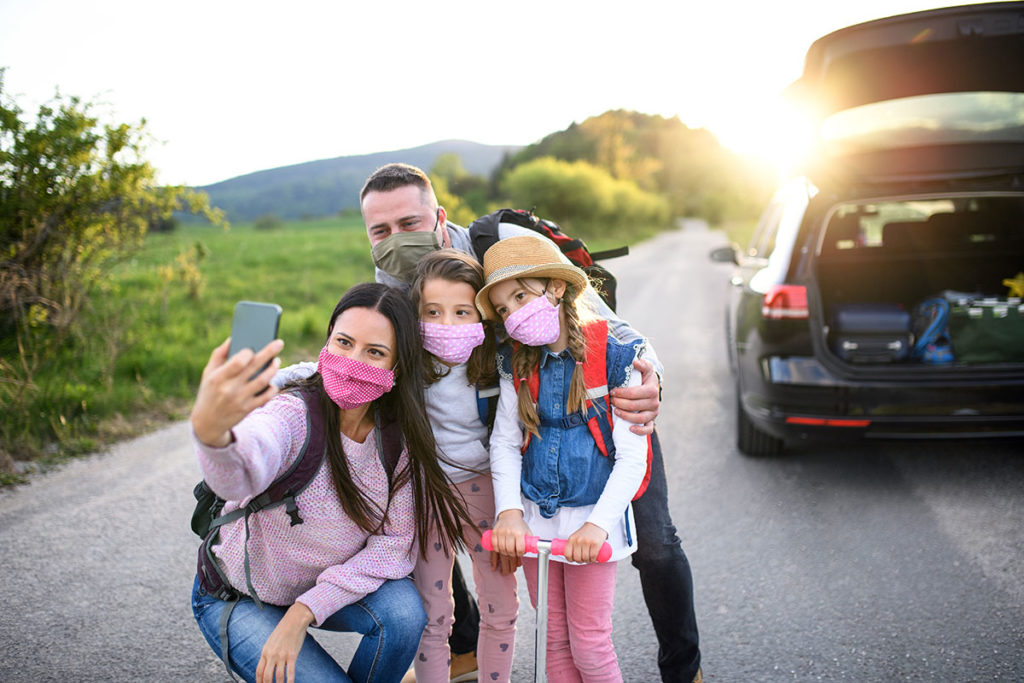
Assessing the Risk of Travel
Before planning a driving trip outside of your local community, the Centers for Disease Control and Prevention (CDC) suggests asking the following questions to determine the risk to yourself and your family:
- Is COVID-19 spreading where you’re going or in your community? (Unfortunately, infection is always a possibility if you travel during the pandemic. Furthermore, even if you don’t have symptoms, you can spread COVID-19 to others while traveling. For these reasons. you may wish to consider traveling somewhere with wide open spaces, like a cottage or cabin, where you can easily spend your vacation self-isolating with your friends or family without coming in contact with others.)
- Will you or those you are traveling with be within 6 feet of others during or after your trip? (Being within 6 feet of others increases your chances of getting infected and infecting others.)
- Are you or those you are traveling with more likely to get very ill from COVID-19? (Older adults and people of any age who have a serious underlying medical condition are at higher risk for severe illness from COVID-19.)
- Do you live with someone who is more likely to get seriously ill from COVID-19? (If you get infected while traveling, you can spread COVID-19 to loved ones when you return, even if you don’t have symptoms.)
- Does the state or local government where you live or at your destination require you to stay home for 14 days after traveling? (Some state and local governments may require people who have recently traveled to quarantine for 14 days. For up-to-date information and travel guidance, check the state or local health department where you are, along your route, and at your planned destination. While you are traveling, it is possible a state or local government may put into place travel restrictions, such as stay-at-home or shelter-in-place orders, mandated quarantines upon arrival, or even state border closures. Plan to keep checking for updates as you travel.)
- If you get sick with COVID-19, will you have to miss work or school? (Remember, people with COVID-19 need to stay home until they are no longer considered infectious.)
Although each travel assessment may vary based upon the relevant circumstances, there is one clear bottom line from the CDC: Do not travel if you are sick, or if you have been around someone with COVID-19 in the past 14 days, and do not travel with someone who is sick.
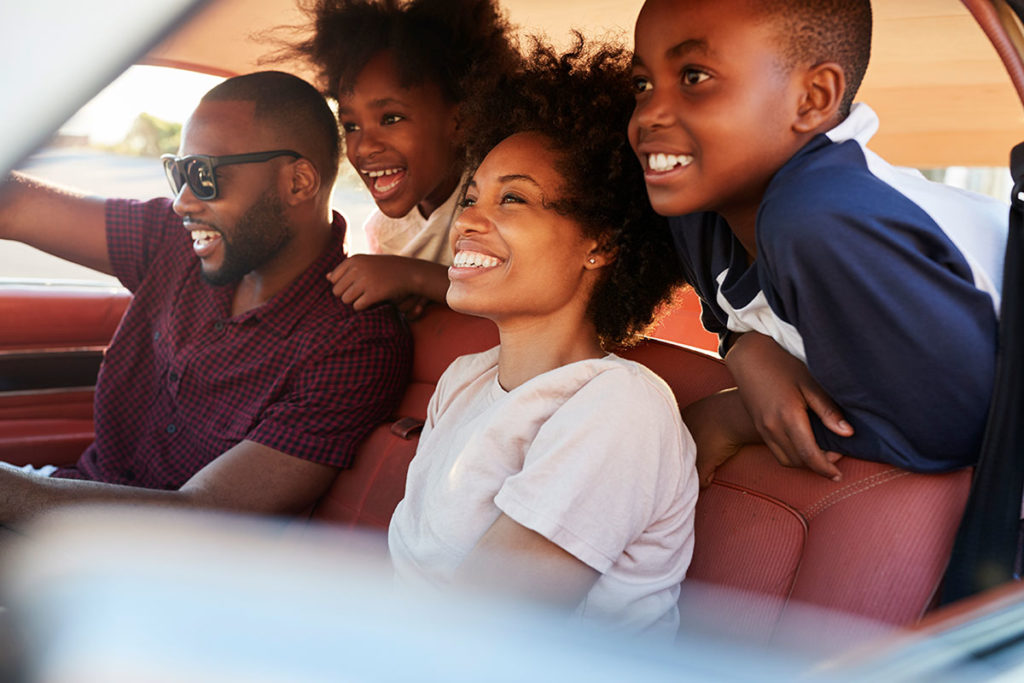
Once You’ve Decided to Travel, Preparation Is Key
Preparation is key to a road trip during the pandemic! In addition to planning your route carefully, taking into account potential travel restrictions across the states, you need to make sure you have the appropriate supplies on hand. Make sure that you bring, and have easy access to:
- alcohol-based (at least 60% alcohol) hand sanitizer
- face coverings to wear in public places
- disposable wipes for disinfecting
- tissues and a toilet paper roll (just in case!)
- sealable plastic bags in which to put used gloves, etc, and a garbage bag to help keep trash from taking over the car
- plenty of water and non-perishable food in case restaurants are closed or you want to minimize your exposure to the public. If you do need to pick up food or drinks during your trip, it is best to do so at drive-throughs, curbside restaurant services or stores, rather than dine-in restaurants. (Many major fast food restaurants, such as Starbucks, McDonald’s, Chipotle, Burger King, Wendy’s, Panera Bread, Domino’s, Shake Shack, and Taco Bell, enable you to order and pay for meals via their apps using a credit card. Once you order, you’re given a code that you say to the staff operating the drive-through windows. You’ll be handed your prepaid meal and can continue on your way, having touched no money or other people.)
- enough of your family’s medications to last for the entire trip
Be aware: Don’t rely on picking up personal protection supplies during your trip as there’s no guarantee they’ll be in stock wherever you’re headed or passing through.
In addition, it is important to to do a pre-trip checkup on your vehicle to help avoid potential issues– no one wants to have car problems on their vacation, particularly during a pandemic! Consumer Reports has a detailed list of items to check on your car before you hit the road, including some instructions on how to do so. Well worth a read!
Gas Station and Public Bathroom Stops
Being on the road during the pandemic will require extra vigilance when it comes to high-traffic stops, such as gas stations and public bathrooms. Here are some helpful tips to help you navigate those “hot spots”:
- Wear disposable gloves while pumping gas, rather than trying to wipe down the nozzle with a disinfecting wipe. After you’re done, discard the gloves outside your car or seal them in a plastic bag for disposal later if a trash can isn’t available. If you don’t have disposable gloves, you can use paper towels, which are sometimes available at the pump or you can bring some with you to cover your hands when you grip the handle.
- Pay for the gas with credit card, rather than cash, when possible, thereby eliminating face-to face contact with a cashier. Plus, a credit card can be easily wiped down after it is used. Even better, rely on technology and pay using your phone–many major filling station brands now allow you to do so via their mobile apps.
- Wherever you use a public bathroom, whether in a rest area, gas station, restaurant or elsewhere, try to minimize the surfaces you touch and be sure not to retouch the faucet or door handles after washing your hands (remembering the “20 second rule“). Use a paper towel or tissue to grab the door handle before you exit. Once you are back in your car, you may wish to use hand sanitizer or a disinfecting wipe on your hands, just to be on the safe side!
- When entering or exiting a public place, such as a gas station or a toilet stall in a bathroom, you may wish to use a disinfecting wipe or paper towel or tissue to open and close doors. Be sure to appropriately discard the wipe, towel or tissue after use.
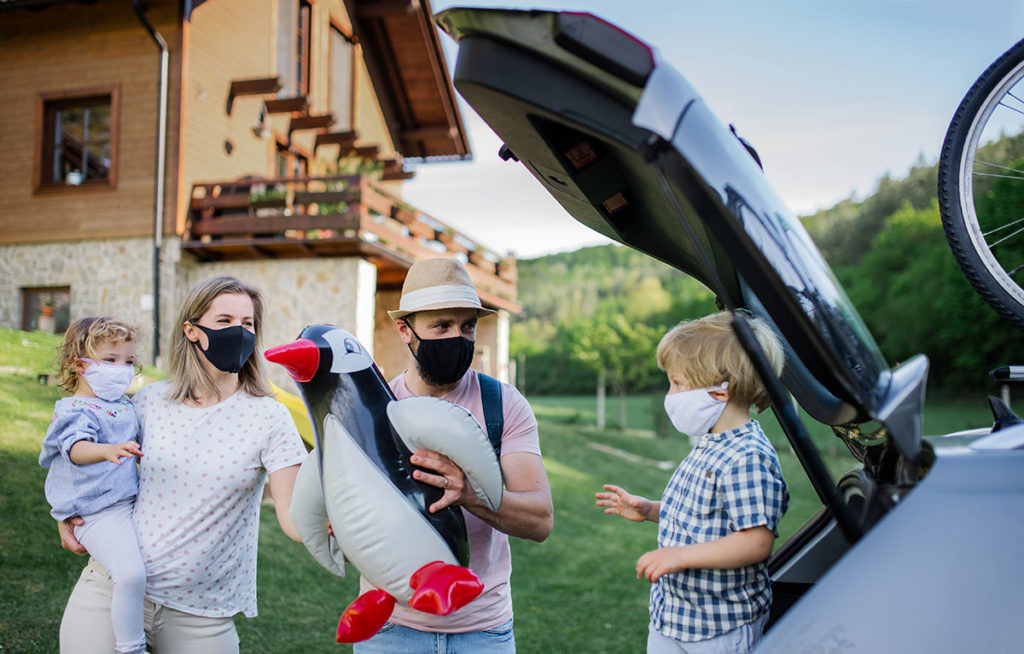
Public Lodgings
During the pandemic, it is best not to “wing it” when it comes to finding a place to stay. Instead, it is recommended that you plan your route and nail down your hotels ahead of time, including taking time to confirm that each place is open and that its available reservations are not limited to those traveling on essential business. Beyond that, the CDC offers the following important guidance relating to overnight travel:
Check the hotel’s COVID-19 prevention practices before you go
- Use options for online reservation and check-in, mobile room key, and contactless payment.
- Before you go, call and ask if all staff are wearing cloth face coverings at work.
- Look for any extra prevention practices being implemented by the hotel, such as plexiglass barriers at check-in counters, and physical distancing signs in the lobby.
- Ask if the hotel has updated policies about cleaning and disinfecting or removing frequently touched surfaces and items (such as pens, room keys, tables, phones, doorknobs, light switches, elevator buttons, water fountains, ATMs/card payment stations, business center computers and printers, ice/vending machines, and remote controls).
Wear cloth face coverings and limit close contact with others
- Wear a cloth face covering in the lobby or other common areas.
- Minimize use of areas that may lead to close contact (within 6 feet) with other people as much as possible, like break rooms, outside patios, inside lounging areas, dining areas/kitchens, game rooms, pools, hot tubs, saunas, spas, salons, and fitness centers.
- Consider taking the stairs. Otherwise wait to use the elevator until you can either ride alone or only with people from your household.
Choose contactless options, when possible
- Request contactless delivery for any room service order.
- If you are considering cleaning your travel lodgings, see CDC’s guidance on how to clean and disinfect.”
There you have it! Obviously travel during during the COVID-19 pandemic will take more careful deliberation, planning and preparation, but it is not impossible. Ultimately, only you and your family can make the decision whether or not to travel in Colorado and beyond this summer, but we are here to help if you wish any input in assessing the possible medical risks to you and your family. As your favorite integrative pediatrician in the Denver metro area, we’re here for you during this uncertain and unusual time. Have a fun, safe Summer!
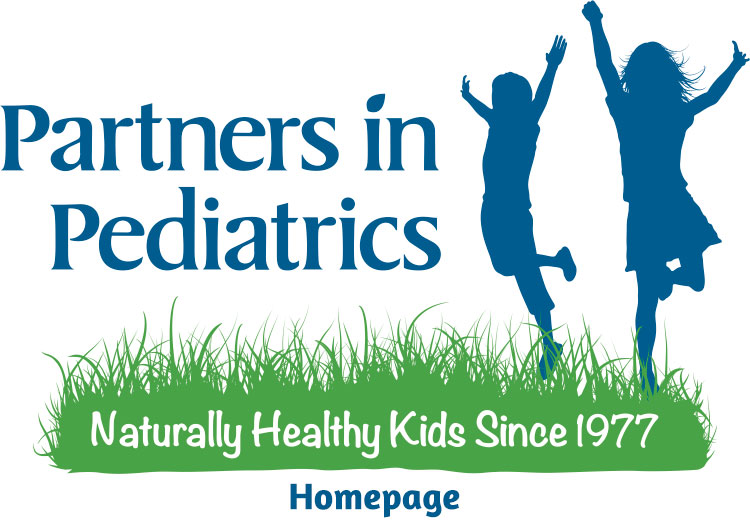

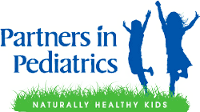
Leave a Reply